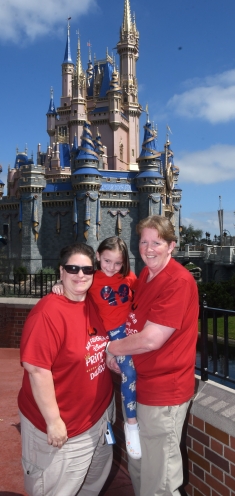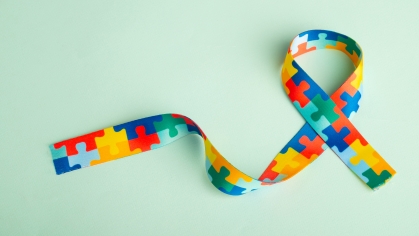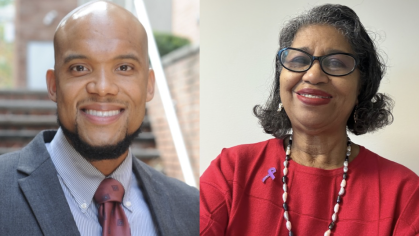An interview in honor of Pride Month with Patricia Langdon, MLS, Training Coordinator for the New Jersey Child Support Institute at the School of Social Work's Institute for Families
Tell us a bit about your journey to the social work community.

My journey was not a direct path. I started my professional career as a realtor, and my desire to have a family was my reason for pursuing a career in social work. I met my spouse over twenty-six years ago. At that time, the LGBTQ+ community did not have the right to marry. Once civil unions came about in New Jersey, we had our third ceremony. I often make a joke about the fact that I love my wife so much that I “married” her four times. The first ceremony was in Vermont when civil unions became legal. The second was a domestic partnership in New Jersey, and the third was the New Jersey civil union. Finally, I legally married her on October 25, 2013, after Governor Murphy signed the bill codifying marriage equality. As a self-employed person, I could not obtain insurance for my “domestic partner” at a reasonable cost. She could not add me to her insurance as she was a general manager for a large chain restaurant where the home office was not in New Jersey. We wanted nothing more than to start our family together. I accepted a position at the New Jersey judiciary, which provided family insurance coverage for my partner/spouse and me. We embarked on a seven-year journey to build a family together. My judiciary career advanced quickly, and my appreciation for life as a civil servant grew, so much so that I desired to pursue a legal career while working at the judiciary. In 2023, I earned my master of legal studies from Seton Hall University of Law specializing in cybersecurity and privacy law. While working towards my degree, I enjoyed mentoring colleagues as well as providing the best service I could to my community. Shortly after receiving my degree from Seton Hall, I accepted a position at Rutgers School of Social Work’s Institute for Families at the New Jersey Child Support Institute. As a training coordinator, I share my knowledge and life experiences as a lesbian wife and mother with the judiciary, support enforcement, and county social services. I offer my perspective, which will hopefully provide a tangible experience for these groups to provide services to our community. All these offices strive to serve their communities by providing fairness and equity to all. I am proud and blessed to assist them in their journey.
What is the significance of Pride Month for you?
Pride Month offers a time for exposure to the community as well as the issues that affect our community. Historically, the LGBTQ+ community had endured prejudice and malicious treatment all stemming from ignorance. This ignorance became the breeding grounds for fear that leached into the medical field as well as the legal realm. Through the month of June, we have a duty to expose the history, political figures, and medicalization of LGBTQ+ identities by the Diagnostic Statistical Manual (which was utilized by the American Psychiatric Association until December 1973) and the effects they had on the LGBTQ+ community (Burton, 2023).
Pride is also a time to enjoy the strides and advancements the LGBTQ+ community has attained. Personally, the right to marry my wife and the advancements in Assisted Reproductive Technology, which helped us produce our beautiful daughter, are among my proudest moments. As a person raised primarily in the Italian Catholic culture, I was not certain that I would ever enjoy a life as a spouse and mother. I feel blessed every day but also cautious about the future. My family and I enjoy our lives as an out and proud family. It is our hope to debunk fear and prejudice by living our truth.
How can the social work community recognize and commemorate Pride Month?
The social work community extends to a variety of professions. It is my hope that Pride Month is a time for everyone to learn the history of the LGBTQ+ community. “Those who cannot remember the past are condemned to repeat it,” said George Santayana. According to the American Civil Liberties Union (ALCU, 2024), there were 515 anti-LGBTQ bills under consideration in the United States.
I am proud to facilitate sessions that offer a glimpse of how this legislation impacts real families. I recently had the opportunity to share my story and how the current laws impact families like my own. The course “LGBTQ+ Family Matters: Custody, Adoption, and Domestic Violence in Child Support” was presented at the New Jersey Child Support Conference in 2024.
In New Jersey, the statutes for establishment of parental rights are dichotomous. After discussions with two trusted confidants that happen to be Superior Court Judges, they concurred that it is better to secure my parental rights by filing for a confirmatory adoption. My wife and I were legally married when our daughter was born. I was on her birth certificate as a parent. My wife had automatic rights for being her gestational mother. However, the law is unclear regarding my parental rights. The only way that I could secure my rights as her parent was to adopt her. Presumption of parental rights due to her being born of marriage was not a guarantee due to our same-sex marriage even though one section of the law stated it provided some rights. However, the same statute a few sections past that presumption of parentage, stated that they had relaxed the laws for same-sex couples to adopt their child. It is quite confusing. In the legally tumultuous times for same-sex couples, I wanted to solidify my rights as a parent. I am proud to say that I completed the adoption process in 2022, giving us all the peace of mind that in the event of a tragedy, I will always be my child’s mother. This type of course is essential to those that attended. Without that personal story, many did not realize the barriers that same-sex families deal with daily. The social work community continually makes strides to be inclusive to everyone. The key for inclusivity is having a basic understanding and desire to provide services to all.
Ultimately, I want the social work community to enjoy the history and celebrations offered during Pride Month!
What can the social work profession or social workers do to support individuals who identify as LGBTQ+ beyond this month?
Those offering services to the LGBTQ+ community need to take the opportunity to explore topics of concern for the community. After the repeal of Roe v. Wade and the influx of anti-LGBTQ+ rights bills and laws, thirty-four bills have been passed in the United States in 2024 that directly affect civil rights, school restrictions, forced outing at school, re-definition of sex, healthcare funding restrictions, as well as other healthcare barriers, and many more.
It is paramount for the social work community to be aware of these issues and how they impact the lives of the LGBTQ+ community. It would be wonderful for the social work community to be not only an ally but also an advocate for the LGBTQ+ community.
While exploring Rutgers University, I was extremely pleased to see how highly ranked our university is positioned on the list of LGBTQ+ friendly campuses. I have personally felt extremely welcomed into the Rutgers University family fold. I am also proud of the impact we have in our community.
Enjoy all there is to offer during Pride Month! I thank you for your interest and support.
Resources
Burton, Neel, M.D., July 3, 2023, When Homosexuality Stopped Being a Mental Disorder | Psychology Today
ACLU, ACLU.org, June 5, 2024, Mapping Attacks on LGBTQ Rights in U.S. State Legislatures in 2024 | American Civil Liberties Union (aclu.org)
This story was created in partnership with Rutgers School of Social Work's Inclusion, Intersectionality, Diversity, Equity, and Advancement (IIDEA) Committee.



